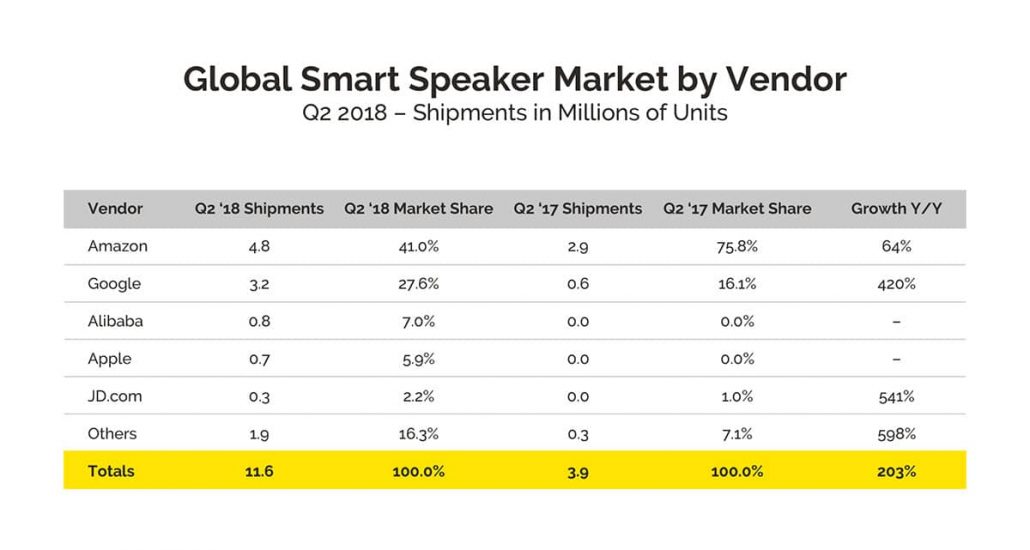Alexa, Google, Siri? Who are the main contenders in voice search?
Just as computers and smartphones use different platforms, the voice search devices who listen to and act on voice commands and search terms work to different standards. The main battle here has so far been between Amazon’s Alexa and Google Assistant. Apple’s Siri is in the running but never truly in the race for top spot.
Microsoft’s Cortana might be a name many people know but the voice assistant was restricted to the now-defunct Windows Mobile platform. It has only this year begun rolling out smart speakers, made in partnership with Harman Kardon. As such, it is the minnow of the platforms currently on the market.
The new kid on the proverbial block is Facebook with the Portal, along with its larger-screened cousin the Portal+. It launched in time for Christmas 2018 in the US, priced at $149 and $299 respectively, to rival the price entry points of the Amazon’s Echo Show and (the screenless) Apple HomePod. Launch dates outside the UK have yet to be announced but it is worth noting the voice recognition technology in use is Alexa. Also, like Amazon’s Echo Show range, the Facebook smart speakers with screens hope to get ahead of the curve by offering video conferencing, via Facebook and Messenger. Google’s Home Hub does not feature a camera and so cannot support video chat.
Who is leading in voice search?
Amazon was the big first mover on voice search in smart speakers, with a user-friendly, affordable smart speaker, the Echo, which helped introduce the world to its famous Alexa character.
Google Assistant was not far behind and the phrase ‘Hey Google’ is now as synonymous with voice search commands as starting a question with ‘Alexa’. Both Google and Amazon have focussed on the low cost market (circa £100) with their smart speakers. Both have recently doubled-down on affordability with the miniaturised Echo Dot and the Google Home Mini, which each retail around £40.
Siri, as ever with Apple, is the preserve of high-end iOs products, including the £300 Apple HomePod smart speaker.
The pricing strategy behind Amazon’s entry-point Echo Dot is widely regarded as being mirrored in China by Alibaba, a popular e-commerce Amazon equivalent. Namely, if the entry cost can be kept down, more consumers will have a direct voice technology connection to order products from the prime e-commerce services in the West and China.
Within just a few months of launching its Genie smart speaker, Alibaba was believed to have sold two million units. JD.com is also making early inroads in the Chinese market with a similar pricing strategy.
As the figures from Strategy Analytics show, the big news is that Amazon’s Alexa is still the number one brand in the home and it is growing at 64% per year. Nevertheless, Google is hot on its heels with 420% year-on-year growth, albeit from a significantly lower base level
Smart speaker sales by market
As they compete in the West, Alexa and Google can probably rest assured the Chinese e-commerce giants are likely to maintain focus on their domestic market, which according to Canalys represents 10% of all smart speakers installed in 2018. This compares to the largest market, the US, which accounts for 64%, and the UK in third place at 8%.
Which voice assistant works best?
All voice search assistants perform very similar functions, such as streaming music, making phone calls, setting reminders and controlling lighting and heating systems (with the correct appliances).
Amazon stands out from the crowd as having an early lead in ‘skills’ due to its first mover advantage. Many brands have developed voice search capabilities that allow a voice assistant user to ask their company to perform a task, such as order a pizza through a particular chain or book a flight with their preferred travel aggregator.
On the flip side, it is fair to say that if you’re looking for great features and a perfect performance from your smart speaker or smartphone, Apple might not be the first place to start. From its early pioneering days, the tech giant has only had problems with voice search, which has led to high-level departures at the company. The platform is synonymous with early promise and a failure to deliver. Given that is only available on high-end devices, it’s telling that Apple voice search devices rarely win comparison tests.
Is Google Assistant better than Amazon Alexa?
The real battle for performance and features, balanced with cost, is between Amazon and Google. Here Amazon tends to just pip Google at the post, as with a recent PC Mag market round-up.
However, this is starting to change. The recent advice from Wired is that although Amazon has the edge because Google has fewer voice search ‘skills’, it is starting to catch up. Added to which, the skills that are available do just about anything a person would want to. Hence, the magazine, an industry bellwether, is starting to favour Google.
The background to this is a widespread acknowledgement that as the use of voice assistants extends from streaming music and setting alarms to search, a betting man would put his money on Google taking the lead.
The simple answer for most people choosing a voice search platform is to consider sound quality and performance. Those who favour great sounding music and have the budget to afford it are likely to pick the Apple HomePod or a speaker from the Sonos range. However, Sonos is typical of speaker manufacturers who are shifting strategies. Having started out being more closely associated with Alexa, it and many others, such as JBL and Harman Kardon, can now function alongside either Google Assistant or Alexa.
Ultimately, regardless of performance and features, which are becoming more uniform across the platforms, many are likely to choose Google or Siri to fit in with the devices they already own.



